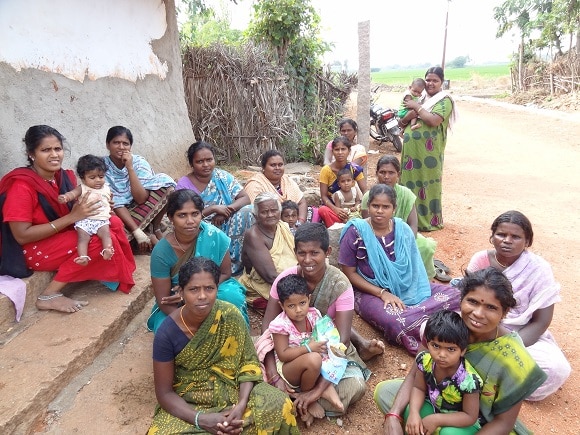Madurai is a city famed for its proud and ancient history, its temples and its palaces. Straddling the Vaigai River, set amongst the rolling, lush green hills of Tamil Nadu, it continues to attract devotees and tourists from all over India and indeed the world.
However, in recent decades, Madurai district has also come to be famed for something much more nefarious – its missing girls.
The practice of female infanticide and foeticide in a string of villages in the Madurai district first came to public attention in the mid-1980s, when the Indian, and then the international media shone a stark spotlight on the issue. Stories began to emerge of babies not more than a handful of days old being starved, suffocated or poisoned – little girls born for the grave.
When the issue came to light, the finger of accusation was pointed firmly at the practice of dowry-giving, which exploded in rural Madurai following the building of the Vaigai Dam and the agricultural wealth this created. But even this is a simplistic explanation of why a family would kill their baby girl.
The root cause of female infanticide and foeticide stems from the powerlessness and lack of voice that too often comes with being born an Indian woman.
Now, both government and non-government groups are working to redefine the status of women in the villages of Madurai district. Grassroots NGOs have sprung up in the region, consisting of dedicated people from local families who have suffered through violence against women and have personal experience with the practice of female infanticide.
Eager to discover what inroads had been made into preventing the killing of baby girls, I – an Australian-Indian woman, the first of two daughters – made a trip to visit one of these NGOs, the Women’s Emancipation and Development (WED) Trust, based in Chellampatti. There I discovered a beehive of activity that has continued since the Trust’s founding in 1992, people working to improve the lives of rural women in more than 60 villages in Madurai district.
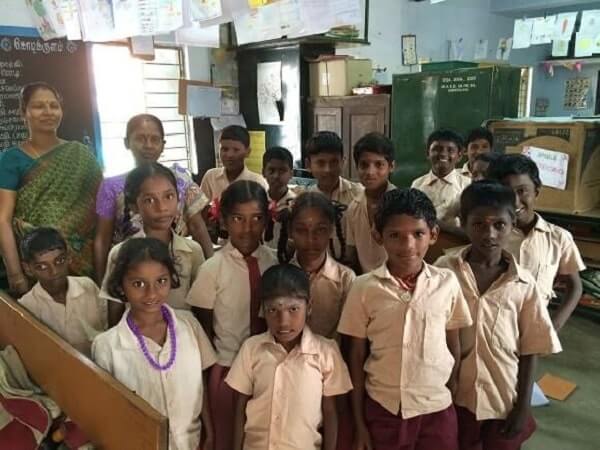
Women’s Emancipation and Development Trust
“Traditionally, sons have been valued far more than daughters,” says Dharma Neethi, one of the founders of WED Trust. “When more than one daughter is born, immediately she is seen as an economic burden.”
A boy represents the continuation of a family’s lineage. He will receive higher education, earn more for any form of employment and inherit his parents’ assets. It is he who will receive his wife’s dowry into the family. And, importantly, he will perform the Hindu funeral rites that will allow his parents moksha, or enlightenment.
On the other hand, a girl’s destiny is nothing but marriage into another family. In rural India, from the moment a girl is born, her parents must sacrifice, sometimes skipping meals to be able to afford their daughter’s coming-of-age ceremony, her wedding ceremony, and her dowry. These festivities have become signs of social status and family honour – the bigger, the better.
Having one daughter is acceptable. Any more and a family can risk bankruptcy.
Added to this is the oppression that women must face on a daily basis. They are not able to own property, inherit, or pass their names on to their children. Even opening a bank account or receiving a social support card has been almost impossible for a woman. In essence, for centuries, there has been little evidence that women have ever even existed; the only lasting memory of their lives being in the features of the children they bear.
It is this lack of social status that Neethi, together with the co-founder of WED Trust, N. Logamani, is working to change.
“Once female infanticide and foeticide were an unavoidable part of life here, there was little shame in it,” Neethi says. “When the media began to report on it, the focus of the government was on prosecuting families who had killed their daughters, but this did not address the real issue. We must work to change the beliefs and the hardships in life that drive people to commit infanticide.”
Although the organisation is small, currently employing just five permanent full-time staff but supported by a raft of volunteers, its activities are far reaching. The Trust’s offices – two clean, well-built structures in Ghandinagar, Chellampati – include a safe house for women who are experiencing problems at home. These problems range from domestic violence, their husbands’ alcoholism, and the threat of divorce and abandonment – problems that often arise because they have failed to provide their husband with a son.
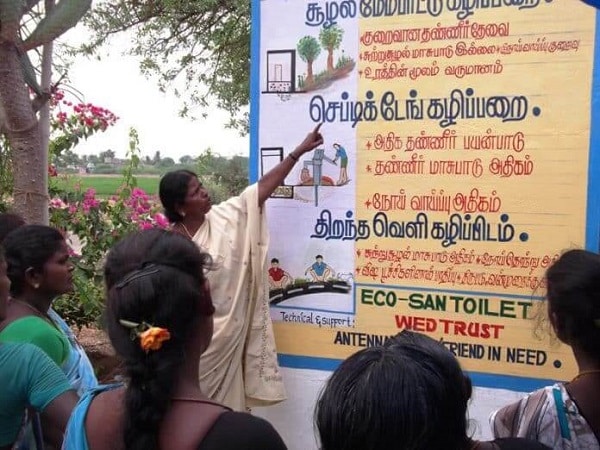
Sutha’s story
On my second day, I was introduced to a young woman named Sutha who had recently been reconciled with her family.
“I’ve been married for seven years,” Sutha told me. She is 24 now, and has three children. Two are with her today, her middle daughter standing shyly by her side and her youngest child, the only boy, sitting on her lap.
“Her husband and mother-in-law were very abusive,” Logamani told me softly.
“Were they angry when you had your daughters?” I asked.
Sutha nods. “When my second daughter was born, my mother-in-law grabbed my hair and threw me out of the house.”
The abuse continued over the years. Her husband openly taunted Sutha with an affair he was having; her mother-in-law beat her regularly.
“I tried to kill myself several times,” Sutha said, matter-of-factly. “I tied a rope around my neck and tried to hang myself.”
Finally, Sutha came to WED Trust, spending several days in the safe house and attending counselling sessions with her husband and family. Logamani runs many of these sessions herself and, coming from the tiny village of Ghandinagar, is able to work within the social context of the villagers.
Sutha’s husband accepted her back into the home, and she gave birth to their third child – a boy.
“Did the counselling sessions work?” I asked her. “Are you happier now?”
“Yes,” Sutha said. “My mother-in-law is nicer to me now, and my husband and I are happy, because of the counselling.” She smiled, a shy, wry smile. “And also because I have a son.”
Sutha’s story reveals yet another facet of women’s vulnerability. If they do not provide the longed-for son, or an acceptable amount of dowry, they can be threatened with divorce or simple abandonment for another woman. With no secure way of earning an income and limited education, such women are at risk of destitution.
WED Trust and other organisations have campaigned long and hard to raise awareness and understanding of what many of us here in Australia take for granted – the inherent human value of being a woman, a girl’s right to life, to education and the freedom to choose her own future. But it is a complex problem requiring a multifaceted, long-term approach.
“We must address this issue from many angles,” Dharma Neethi says. “We must provide a counter for each of the practices and ways of thinking that undermines the status of women.”
But how do we address these issues?
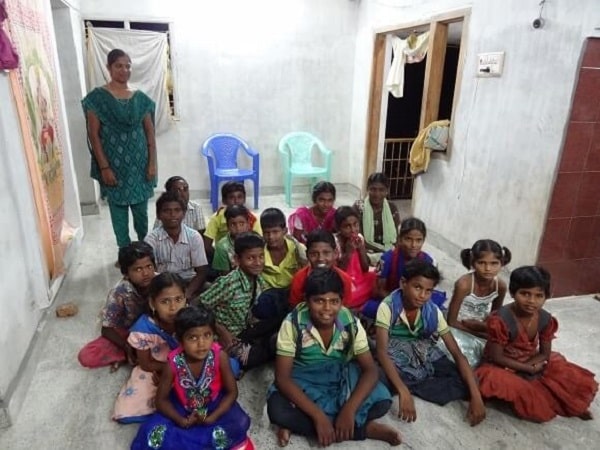
Raising awareness and improving education
Campaigning against the practice of giving dowry is an obvious step. Currently, a girl’s family is often required to give at least ten sovereigns of gold as dowry. This is often accompanied by white goods, pots and pans, furniture – all items that pass into her husband’s possession and can be readily sold for cash, leaving her with nothing.
“If a dowry must be given, we are trying to encourage families to give their daughters land or property, or set up a bank account in her name. This gives the woman assets that she has control over, providing her with financial freedom that her husband’s family cannot easily take from her.”
Encouraging families to allow their daughters to inherit and pass on the family’s assets and name is another step, and for Dharma Neethi, this starts at home.
“I have two girls,” Neethi tells me. “My daughters are the only ones in their classes with both my and my wife’s initials. They’ll carry both our names and will inherit our farm.”
The WED Trust provides essential supplies of food and clothing for families with additional newborn girls, and uniforms and educational material for girls entering secondary and tertiary education.
“This helps shift the parents’ view that their daughter is a financial strain,” Neethi says.
However, it is education that is key to turning around the deep-rooted beliefs that keep women shackled.
“The views of the older generation are hard to change,” Dharma Neethi admits. “It is the children who are our best chance of improving this situation.”
WED Trust runs approximately 12 free Skill Development Centres in villages every weekday after school. Here, children learn the importance of gender equity and how to balance the roles of men and women in their family through music, dance and art.
These initiatives have had a great impact over the past two decades.
“Female infanticide and foeticide have been drastically reduced,” Dharma Neethi states. “Awareness of gender equality is spreading in this area.”
Educating their daughters is a cause many mothers have always been passionate about, but have only recently become empowered to support.
Ananda Jothi was pulled out of school at age 13, and, like many women, became a housewife at a young age. She took up tailoring five years ago because her husband refused to pay for her two daughters’ education.
“He didn’t see the need to educate them because they are girls,” Ananda told me. “And all his earnings were spent on alcohol. I wanted my girls educated.”
With a micro-loan from WED Trust and her fierce determination, she now runs a small tailoring business out of a tiny shop in Karumathur. Her eldest daughter Abarna goes to an English-medium school, and the younger, Anusia, to a Tamil-medium school. “I can’t afford to put them both in English-medium schools, and my husband doesn’t support their education at all. But at least they are both still going to school. That I can do.”
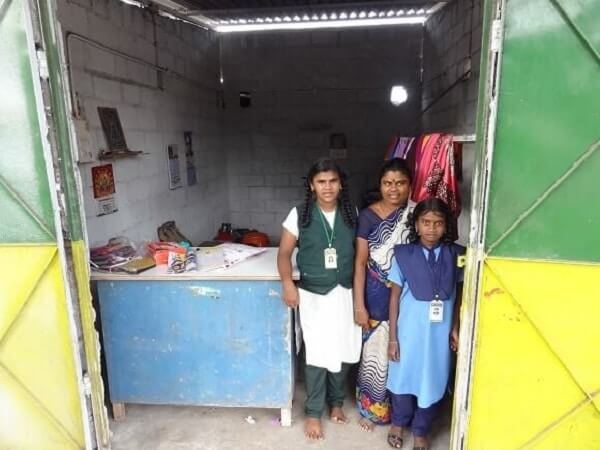
Changing society’s perceptions
There is still a long way to go, with signs that the practice of female infanticide and foeticide have not been completely wiped out.
In the village of Mamarathupatti, I meet Athirstalaksmi, who lives with her husband, mother-in-law and three daughters. There is a five-year gap between her eldest daughter and her one-year old twins. Two baby girls were born in between, and neither survived their first few days of life.
“I don’t believe in giving dowry,” Athirstalaksmi’s mother-in-law says. “I have two sisters, and I did not accept dowry for Athirstalaksmi. I am happy with girl-children. But she went home to her mother’s house in Coimbatore to have the children, and they were killed there.” It was Athirstalaksmi’s own family who killed her second and third daughters.
For the birth of the twins, Athirstalaksmi stayed in Mamarathupatti. But days after the girls were born, her maternal aunt arrived – to kill them.
“We had to call the police to stop her from coming into the house,” Athirstalaksmi says, as the twins cling to her sari.
While infanticide cases such as these are becoming much rarer, the bias against girls may simply be better hidden. Sex-selective abortions – female foeticide – remain a troubling problem, even though it is illegal throughout India to reveal the gender of an unborn baby.
Logamani took me to visit another family in Chellampatti, not far from WED Trust’s headquarters, where Malathy lives with her husband and three children. The two eldest are girls, aged 13 and eleven. They are bright, well-spoken and sweet. I asked them what subjects they enjoy at school, and they rush to show me their trophies for sport and dance, certificates for first place in Mathematics and English.
Malathy agrees that education is key for her daughters’ future, and is adamant that she will support them.
There is a third child, Logamani tells me, and Malathy slips into her small home’s second room to proudly bring out her sleeping son. The little boy is just over two years old. I remark on the significant age gap between the children, and receive an embarrassed smile in reply. Logamani explains, in English.
“There were three babies in between, all girls. They aborted them each time.”
Now, with the birth of her longed-for son, Malathy has undergone ‘family planning’ – sterilisation.
It is this odd mixture of old beliefs and new ideas that permeates the district. And while the signs in Madurai district are of a steady march toward a better, more equal life for its women and girls following widespread female infanticide and foeticide, it is not something that can happen soon enough. Now the glaring eye of the media has lost its intensity, it is more important than ever to support those who are working so hard to help girls live a safe, fulfilling, empowered life.
Read More: South Asian solidarity on International Women’s Day



